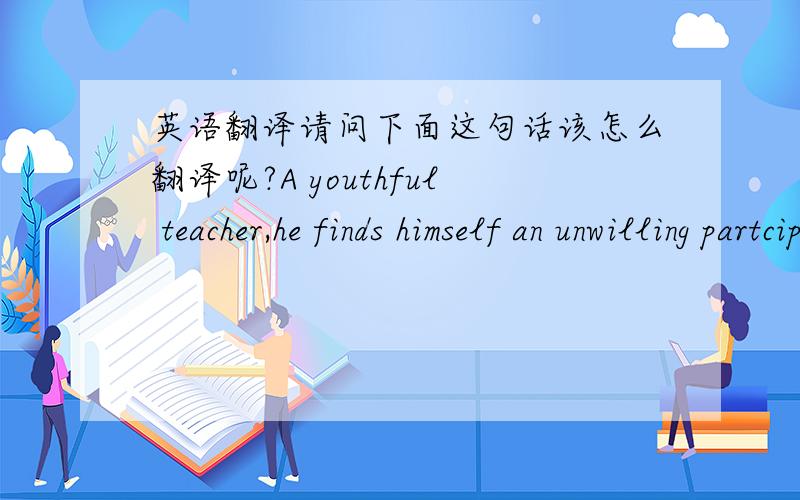英语翻译请问下面这句话该怎么翻译呢?A youthful teacher,he finds himself an unwilling partcipant in school politics.himself 在这里是指“他发现他自己.”还是“他自己发现.”什么时当加强语气,什么时候该代
来源:学生作业帮助网 编辑:作业帮 时间:2024/07/27 16:31:40

x��R�N�@����R�n
W.�Wۤ���w
!�� �P
є�F^b�g��/
Z�$B�+w3��9�s��}$�%�9�G���7+�a?5�6�}��&���jb-I�r�C?�GU>��|0�� $H�
��K%(��'��t%�� ]����A�$P|8,9,
�P��TiQ�Y"�KN'&Z�
��M3
z �'��2�J�E�m���=8�訸��Ʒ覆^��
��=��vG-��={�~��6���8�s�i8�[DB,���}���ܽ�
9��d�d��XQ�E�Gf�M8�����H���i8�陡l>P%_U
��S��}
�m
7���b>�Z}Z��z�m�kR ��*ԗo�1X�B���k��:�5�wf�
�n}�Y�i� �8��
�ɦ��L�
���
英语翻译请问下面这句话该怎么翻译呢?A youthful teacher,he finds himself an unwilling partcipant in school politics.himself 在这里是指“他发现他自己.”还是“他自己发现.”什么时当加强语气,什么时候该代
英语翻译
请问下面这句话该怎么翻译呢?
A youthful teacher,he finds himself an unwilling partcipant in school politics.
himself 在这里是指“他发现他自己.”还是“他自己发现.”
什么时当加强语气,什么时候该代词呢?
英语翻译请问下面这句话该怎么翻译呢?A youthful teacher,he finds himself an unwilling partcipant in school politics.himself 在这里是指“他发现他自己.”还是“他自己发现.”什么时当加强语气,什么时候该代
A youthful teacher,he finds himself an unwilling partcipant in school politics.
1.himself 在这里是指“他发现他自己.”
2.反身代词在句子中作宾语或同位语.在此句是同位语.
3.他发现自己不愿意参加学校的行政工作.
是他发现自己不愿意参加对学校的行政工作。
他发现他自己...
好象句子不通he finds himself HAVE AN unwilling partcipant in school politics
他发现他自己
英语翻译请问下面这句话该怎么翻译呢?A youthful teacher,he finds himself an unwilling partcipant in school politics.himself 在这里是指“他发现他自己.”还是“他自己发现.”什么时当加强语气,什么时候该代
英语翻译请问这句话该怎么翻译比较好?
英语翻译请问大家这句话该怎么翻译?
英语翻译如题 这句话该怎么翻译呢?
I thought about proceeding in my career to become a teacher.请问这句话该怎么翻译呢?
英语翻译这句话该怎么翻译?
英语翻译这句话该怎么翻译啊?
英语翻译这句话该怎么翻译?
英语翻译请问这句话该怎么理解?
英语翻译请问这句话怎么翻译,
英语翻译请问这句话怎么翻译.
英语翻译请问怎么翻译这句话呀,
英语翻译比如good old susan,怎么翻译old susan这个昵称呢/这句话又该怎么翻译呢/
英语翻译怎么翻译这句话呢
英语翻译这句话怎么翻译呢
英语翻译这句话怎么翻译呢?
英语翻译你今天做了几单买卖.请问这句话该怎么翻译
英语翻译on the table明显不是原意.这句话该怎么翻译呢